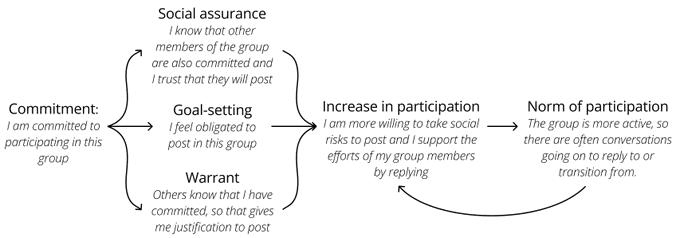This paper argues that online spaces become ghost towns because it's too easy to lurk without contributing, and that asking people to regularly re-commit—or the incoming messages start getting muted—reverses the trend. arxiv.org/abs/2410.23267
It works! #cscw2024 paper by @lindsay
(7/7) Why would this matter? Small-group interactions are beneficial to users' mental health and wellbeing, by providing opportunities for social support and relationship-building. However, these groups often struggle to reach a sustainable activity level, where Commit can help.
(6/7) Participants treated sustaining the conversation as a shared responsibility of the group. Commitment served as an excuse for messaging, lowering the social risk. These effects then compounded, since one user participating lowered the threshold for others to join in.
(5/7) We found that Commit participants *doubled* their messaging activity without compromising quality. In fact, Commit participants had more interesting & deep conversations, growing closer with each other during the study. How did Commit achieve this effect?
(4/7) We then ran an evaluation with 57 participants in 12 groups (split between Commit and a control condition) interacting for three weeks. The control condition employed similar notification and banner reminders, but without messaging around commitment.
(3/7) We built Commit: a smartphone group messaging app built around the commitment mechanism. In Commit, people commit to messaging the group at least once every two days. Users are reminded to fulfill and renew their commitment with notifications and in-app banners.
(2/7) Our design asks group members to “commit”: explicitly promise to participate in discussion on a regular basis. Committing is a condition of membership: there is no "social loafing" option.
Have you ever worried that no one would respond to your message? Our
#CSCW2024 paper proposes a commitment-based design in online groups to address this:
https://arxiv.org/abs/2410.23267 🧵


Commit: Online Groups with Participation Commitments
In spite of efforts to increase participation, many online groups struggle to survive past the initial days, as members leave and activity atrophies. We argue that a main assumption of online group design -- that groups ask nothing of their members beyond lurking -- may be preventing many of these groups from sustaining a critical mass of participation. In this paper, we explore an alternative commitment design for online groups, which requires that all members commit at regular intervals to participating, as a condition of remaining in the group. We instantiate this approach in a mobile group chat platform called Commit, and perform a field study comparing commitment against a control condition of social psychological nudges with N=57 participants over three weeks. Commitment doubled the number of contributions versus the control condition, and resulted in 87% (vs. 19%) of participants remaining active by the third week. Participants reported that commitment provided safe cover for them to post even when they were nervous. Through this work, we argue that more effortful, not less effortful, membership may support many online groups.
“Andreessen Horowitz is warning that billions of dollars in AI investments could be worth a lot less if companies developing the technology are forced to pay for the copyrighted data that makes it work.” Via neil turkewitz.
https://www-businessinsider-com.cdn.ampproject.org/c/s/www.businessinsider.com/marc-andreessen-horowitz-ai-copyright-2023-11?amp

Andreessen is not at all 'techno-optimistic' about this particular AI scenario
The famed venture capital firm a16z is fighting alongside major tech companies against potential copyright rules that would address generative AI.
"A 91-year-old man honored by Israel for saving a Jewish life during the Nazi Holocaust has returned his medal in protest of the Gaza assault. Henk Zanoli was given Israel’s Righteous Among the Nations award for his actions under Nazi occupation in Amsterdam. In 1943, Zanoli smuggled out a Jewish boy and helped hide him in his home for two years, despite Nazi suspicion he and his family backed the resistance.
https://www.youtube.com/watch?v=o7S77X9Sxx4

Nazi Resister Returns Holocaust Medal to Israel After Losing Relatives in Gaza
